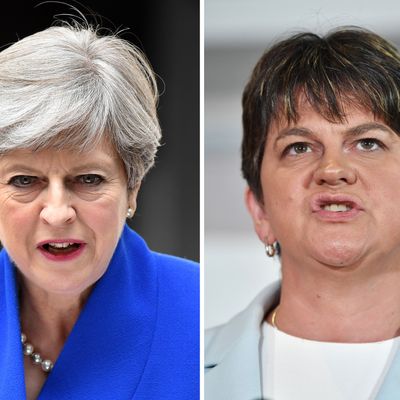
Despite what the whole world recognizes as a horrific performance in yesterday’s general election, which she called to strengthen her government, it seems Theresa May will hang onto 10 Downing Street for the time being thanks to the support of the ten parliamentary representatives of Northern Ireland’s Democratic Unionist Party. The DUP, long the political vehicle for Ulster Protestants, seems to be making a point of helping May in order to punish Labour for Jeremy Corbyn’s long-ago expressions of sympathy for the Irish Republican Army. According to The Guardian:
“The two parties [Labour and DUP] have worked well together for two years. There’s no reason to suppose they won’t continue to do so in future. But the point made time after time to Labour MPs remains: for as long as you allow yourselves to be led by an IRA cheerleader, you exclude yourselves from entering No 10,” said a DUP source.
The DUP will not, apparently, join in a formal coalition with the Tories, but will support it on key votes in Commons — its ten MPs along with the Conservatives’ 318 creates a bare majority of the 650 members. Its principal demand in exchange for propping up May is that in Brexit negotiations, scheduled to begin next week, the U.K. refuse to consider some “special status” for Northern Ireland (due to its long border with EU member Ireland) that might tend to detach the embattled region from the rest of the country.
While the Tory/DUP deal decisively blocks any move by Labour to form its own coalition, the long-range prospects for May are iffy. Some Tories are publicly — and undoubtedly many privately — suggesting her days as prime minister and party leader are numbered. There’s already speculation that foreign minister and former London mayor Boris Johnson could mount a challenge to May or succeed her in the event she resigns. In the current atmosphere of instability, there’s also talk of another general election, perhaps as early as this autumn.
From a much broader perspective, Conservatives can take some solace in the returns as suggesting that with stronger leadership they still are the U.K.’s natural governing party. Aside from emerging as the party with a near majority of MPs, the Tories won the popular vote by about 2 percent. And their 42.4 percent of the popular vote was actually the highest percentage the party has won in 30 years (they won an identical percentage in their last Thatcher-led campaign in 1987).
It’s also true that this was the first British election since 1970 — that’s right, 1970 — in which both the major parties won over 40 percent of the popular vote. And that points to an underlying dynamic of the election that helps explain it: the collapse of minor parties. The poor performance of the Scottish Nationalists yesterday is the most obvious example: Surprise losses to the Tories in Scotland probably saved May’s bacon as much as anything else, and the SNP is acknowledging it may have to shelve plans for a second independence referendum given its signs of weakness. Less noticed was the failure of the largest nationwide “third party,” the Liberal Democrats, to recover from its catastrophic performance in 2015. Yes, the LibDems regained a few seats in Parliament, but their share of the popular vote, at 7.2 percent, was its worst since its predecessor the Liberal Party took 5.9 percent in 1959.
The one sure thing going forward is that the long-simmering revolt against Jeremy Corbyn as Labour leader is going to subside for now. His campaign appeared to mobilize young voters quite successfully, and Labour made sizable gains in London and the Tories’ onetime southern English stronghold. In a campaign in which the eventual (for the time being) winner talked endlessly of “stability,” the British political scene remains anything but stable.






























